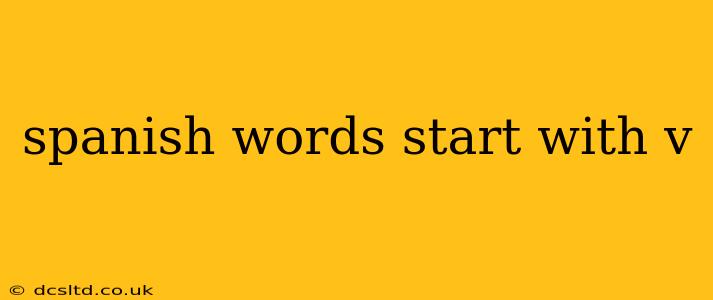Learning a new language can be a rewarding experience, and mastering the vocabulary is a crucial step. This guide delves into the fascinating world of Spanish words beginning with the letter "V," exploring their meanings, usage, and providing helpful examples. We'll cover a range of words, from common everyday vocabulary to less frequently encountered terms.
What are some common Spanish words that start with V?
Many common Spanish words begin with "V," offering a diverse range of meanings and applications. Some of the most frequently used include:
- Vacaciones (vacations): This is a word everyone learning Spanish quickly learns! It's used to refer to holidays or time off from work or school. Example: "Voy de vacaciones a la playa." (I'm going on vacation to the beach.)
- Ver (to see): A fundamental verb, crucial for everyday communication. Example: "Veo un pájaro." (I see a bird.)
- Verde (green): A simple color adjective. Example: "El césped es verde." (The grass is green.)
- Venir (to come): Another essential verb, expressing the act of coming or arriving. Example: "¿Vienes a la fiesta?" (Are you coming to the party?)
- Vida (life): A powerful noun referring to the state of being alive. Example: "La vida es bella." (Life is beautiful.)
- Viento (wind): Describes the movement of air. Example: "Hay mucho viento hoy." (It's very windy today.)
- Vino (wine): A popular beverage. Example: "¿Quieres un vaso de vino?" (Would you like a glass of wine?)
- Volver (to return): Indicates the action of going back. Example: "Volveré pronto." (I will return soon.)
What are some less common Spanish words starting with V?
Beyond the everyday words, Spanish offers a rich vocabulary with less frequently used terms starting with "V." Exploring these can significantly expand your linguistic abilities. Examples include:
- Valiente (brave/courageous): Describes someone possessing courage. Example: "Es un hombre valiente." (He is a brave man.)
- Vale (it's worth it/okay): Used informally as an expression of agreement or acceptance. Example: "Vale, lo haré." (Okay, I'll do it.)
- Vacío (empty): Describes something lacking content. Example: "El vaso está vacío." (The glass is empty.)
- Variedad (variety): Indicates a range of different things. Example: "Hay una gran variedad de frutas." (There's a great variety of fruits.)
- Vapor (steam/vapor): Refers to water in its gaseous state. Example: "El vapor sale de la olla." (The steam is coming out of the pot.)
- Vehemente (vehement/passionate): Describes something intense or forceful. Example: "Tuvo una reacción vehemente." (He had a vehement reaction.)
Are there any verbs in Spanish that start with V?
Yes, several important verbs in Spanish begin with the letter "V," as highlighted earlier. These verbs are fundamental to constructing grammatically correct and meaningful sentences. Mastering their conjugations is crucial for fluency. We've already discussed ver, venir, and volver. Others include:
- Vaciar (to empty): The act of removing the contents of something.
- Valorar (to value/appreciate): To assign worth or importance to something.
- Variar (to vary/change): To differ or undergo alterations.
How can I learn more Spanish words that start with V?
Learning a new language is an ongoing process. To expand your vocabulary of Spanish words starting with "V," consider these methods:
- Use flashcards: Create flashcards with the word, its pronunciation, and an example sentence.
- Read Spanish books and articles: Immersion is key to expanding vocabulary naturally.
- Watch Spanish-language movies and TV shows: Pay attention to how words are used in context.
- Use language learning apps: Many apps offer vocabulary building exercises.
- Practice speaking with native speakers: This is the most effective way to improve fluency and learn new words organically.
This comprehensive guide provides a solid foundation for understanding and utilizing Spanish words that begin with "V." Remember that consistent practice and immersion are key to mastering any language. ¡Buena suerte! (Good luck!)
